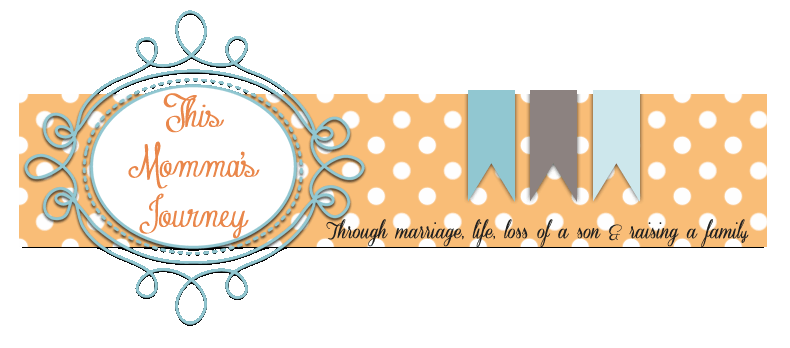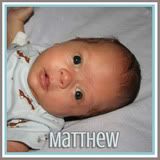In 1988 Congress decided that October would be Pregnancy and Infant Loss Awareness Month. October 15 specifically is Pregnancy and Infant Loss Remembrance Day.
Sacramento Parent Magazine (http://www.sacramentoparent.com/community.htm) is a local magazine that focuses on a lot of parent issues on a local level.
A month or so ago one of the writers contacted us regarding their October Issue. The magazine wanted to tackle some of the tougher parts of pregnancy and infant loss, some of the issues that are not often dealt with. They asked if we would assist them with an interview. We did.
Life After Loss
Coping with the death of a child
by Heidi Doerfert
Every parent has two nightmares – one is the fear that something will happen to you and you won't be there for your child; the other is that something terrible will happen to your child. Sadly, that other nightmare comes true for approximately 2,500 parents in the United States every year, parents who lose their babies to Sudden Infant Death Syndrome (SIDS). Denise Miller, a 26-year-old mother from West Sacramento, is one of those parents.
Denise's daughter, Kaitlyn, has sunny blond hair and bright blue eyes. She is just shy of her fourth birthday when we meet. I watch Kaitlyn pluck a flower from a nearby bush and skip over to her mommy. Denise smiles as her daughter hands it to her. Denise's pregnancy with Kaitlyn was fairly easy, she says, aside from some morning sickness in her first trimester. With Matthew, it seemed things would go even more smoothly; she felt fine, even energetic. Then, at six months, her water broke.
She was diagnosed with preterm premature rupture of membranes, or pPROM. In most pPROM cases, women deliver in the first 72 hours to 12 days, but Denise was hospitalized for over nine weeks, only allowed to lie on her left side. She went into labor at 33 weeks, and her baby boy, who was breech, was delivered via C-section.
Matthew had typical preemie issues, including lung problems. After a month in the Neonatal Intensive Care Unit (NICU), Matthew finally came home. Denise, her husband, Dusty, and big sister, Kaitlyn, were all ecstatic. Denise says Matthew nursed frequently, was gaining weight and doing well. "Being a preemie, he wanted to be held a lot," Denise remembers, something his parents were "more than happy" to do. Still, they were very careful not to expose him to germs. They avoided enclosed public places and even limited preschooler Kaitlyn to toe kisses.
On October 15, 2007, 10 week-old Matthew didn't wake up for his 2:30 a.m. feeding. Dusty tried to resuscitate him until the EMTs took over. Denise knew the situation was dire when they wouldn't let her ride in the ambulance. She followed in the sheriff's car while Dusty stayed behind to wait for Kaitlyn's grandparents to come over. The circumstances left Denise alone when she received the news of Matthew's death.
Despite their trauma, the Millers agreed to an optional SIDS research study. Just hours after Matthew's death, hospital staff came to their house and re-created how the baby slept. They took photos and even took samples of Denise's breast milk. "I was basically incoherent at this point," Denise recalls. "We were just going through the motions."
Denise and Dusty couldn't bear to go home after the loss. "We still had unopened baby gifts… It was just too much," says Denise. They stayed at her parents' house for two weeks. No further answers came from the researchers' efforts, leaving the Millers to puzzle over the SIDS diagnosis.
No Real ExplanationSIDS is the nation's leading cause of death for babies between 1 and 12 months old, with ninety percent of those cases occurring before 6 months, yet it remains somewhat of a medical mystery. Research (published in the November 2006 edition of the Journal of the American Medical Association) has indicated that infants who die of SIDS may have abnormalities in a part of the brain that helps control heart rate, breathing, blood pressure, temperature, and arousal. Dr. Hannah Kinney, the study's senior author, believes that with further investigation, healthcare providers may one day be able to identify, prevent, and maybe even treat SIDS. Still, for families like the Millers, these findings offer little (if any) comfort, and a year after baby Matthew's death, the family still struggles with the fact that they have no real explanation for why their baby died. "We did everything right," says Denise. "And we still lost our son."
According to FirstCandle.org, an online support community for parents who have lost children to SIDS or stillbirth, it is very important that all those touched by a SIDS death understand that SIDS has no specific symptoms, that it occurs in the best of families and to the most capable, careful and loving parents.
Close to a year later, the raw emotion of her loss is still evident when Denise talks about it, yet her main concern now is Kaitlyn and how she is handling her own grieving process. "We didn't tell Kaitlyn her brother died for four days," says Denise with tears in her eyes. "Forever is a hard concept for a three-year-old."
Helping Kids CopeLyla Tyler, a Sacramento Marriage and Family Therapist, says children may experience the same five stages of grief that adults do (denial, anger, bargaining, depression and acceptance), although not necessarily in the same order. "Young children don't understand the finality of death," explains Tyler. "They will have a really hard time with that concept. They may ask when their sibling will come back from heaven and those types of questions." Tyler encourages parents to use the term "die" and not vague terms like "gone away."
Some kids will even be scared that they, too, might die like their sibling; these children need reassurance. In a SIDS case, an appropriate explanation could be, "the baby died of something called SIDS. We don't know why it happens but it only happens to some babies."
Young children may also think they did something to cause the baby's death. It's typical for an older sibling to be jealous of a baby sister or brother, and if they wished for the baby to "go away" and then it actually happened, they could feel responsible. In this case, parents may see regression – potty accidents, acting like a baby, etc. The child may also want to become a baby again to replace the lost child for their parents.
Some children handle grief by escaping into play and pretending the baby is still alive. Others may keep it inside and not show a lot of emotion. There also may be aggression and acting out. Tyler says all of these behaviors are normal. "What you look for is if the child is moving on or if they are stuck. After six months to a year, have they gotten back to their normal play? Have the grief behaviors lessened in frequency and intensity?"
Denise says Kaitlyn used to be very outgoing and loved visiting family, but since the death of her baby brother, she has developed separation anxiety. Tyler says this is a normal response, but if it continues for several months, Mom and Dad must take a look at their own behavior. Parents who have lost one child may become very anxious and fearful of losing another child. With the Millers, Tyler would suggest that Kaitlyn go to Grandma's for a very short amount of time at first, gradually extending the length of her visits.
If parents are stuck in their own grief, a child will definitely pick up on that, Tyler notes. "Preschoolers depend upon their parents to regulate them and their mood. If they have a parent who is very depressed and having a hard time, it will be more difficult for the child." Depression in a young child will manifest itself in withdrawal, loss of appetite, trouble sleeping, and poor concentration. Tyler says art therapy, drawing pictures of what makes them sad, is very helpful. She also encourages parents to talk about the sibling, read to them from books about death that are written for young children, and help their child make a memory book about their brother or sister.
Social support groups also provide comfort and help to both parents and children. Denise believes talking about Matthew and keeping his memory alive is essential to her healing process. She found solace through online SIDS and pPROM support groups, and the family visits Matthew's grave on a weekly basis. Tyler notes that this can be a comforting exercise for some children, but stressful for others. She encourages parents to pay attention to their child's behavior at the cemetery. If they seem uncomfortable, it shouldn't be forced upon them. Our society is often uncomfortable talking about death. Family and friends may fear saying the wrong thing or be just as afraid of saying nothing. Tyler offers these tips for being a good listener: Don't make guesses as to why the child may have died or say things like, "Well, you can have more children" or, "I guess it wasn't meant to be." Instead, simply allow those who are grieving to talk about their loss as much as they need to, and offer specific support, such as bringing dinner over on a Friday night or helping fold laundry on Tuesday morning. As Denise notes, the pain lasts way beyond the week or two that everyone is gathered around after the funeral. "It doesn't get any easier with time," she says. "You just learn how to handle it better."
[SIDEBAR:]
Sharing Parents' Annual Remembrance Ceremony:
"Heart Within My Heart"Sunday, October 123pm - 5pmMcKinley Park Rose GardenSacramento (corner of H St & 33rd St)
October is Pregnancy and Infant Loss Awareness Month. Parents who have lost an infant (from the time of conception through early infancy) are encouraged to honor their children in a candle lighting ceremony, and to meet with other parents and Sharing Parents volunteers afterward. For more information, call 916-424-5150, email sharingparents@yahoo.com, or visit www.sharingparents.org.
-













